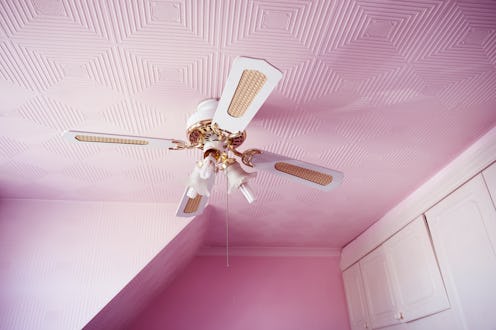Wellness
An Expert Explains The One Sneaky Reason You Might Want To Turn Your Fan Off At Night

If you live in a hot, humid area, summer can be pretty miserable; the air is so thick outside that it feels like a warm, wet blanket is wrapped around you. Stuck without an air conditioner? You're probably leaving a fan on at all times to try and stay as comfortable as you can, even overnight. But sleeping with a fan on could dehydrate you.
The truth is that sleeping with a fan on can have some annoying side effects, but not everyone will experience them. "When you run a fan while you sleep it can move dry air around as well as pollen and dust," Dr. Seema Sarin M.D., director of lifestyle medicine at EHE Health, tells Bustle. "A fan can cause your nasal passages and mouth to lose precious moisture through evaporation, drying them out."
The constant blast of air on your body can certainly leave you more dehydrated than usual. "Some people often sleep with their eyes partially open, so their eyes can dry out," Dr. Sarin says. "If they sleep with their mouth open the throat can dry as well."
However, this doesn't mean a fan is a terrible option. "If you are hot you will sweat. Sweat depletes moisture in your body and can cause dehydration," Dr. Sarin says. So you may wake up dry-mouthed regardless of whether your fan is on. You can tell if you're getting dehydrated at night if you wake up with dry nasal passages and mouth, or experience leg and foot cramps in bed, she says.
There's one more thing to keep in mind, though: back in 2012, a study published in Cochrane Library found that there is little evidence that shows that fans are even helpful at all during a heat wave. When fans pull cool air into the room, they lower body temperature by helping to evaporate sweat. This is great — when the temps are under 95 degrees. But when they get higher than that, they end up blowing air across your skin that's hotter than your body, and that can make you sweat more. If you're sweating and not replenishing those fluids, you can become dehydrated. And if you're sleeping, you're not replenishing fluids — you're just becoming dehydrated. "If it's over 95 degrees where you are sleeping, you might want to consider turning off the fan and finding another way to stay cool," Dr. Sarin says.
If you're using a fan and you're worried about dehydration, be sure to keep yourself hydrated. "Make sure you are drinking throughout the day; don’t wait until you are thirsty," Dr. Sarin says. She recommends sticking to water, but fruit juice, broth, herbal tea, and milk are also good choices. Alcohol before bed might not help. "Alcoholic beverages tend to dehydrate, so drink them in moderation," she says.
Expert:
Dr. Seema Sarin M.D., EHE Health
Studies cited:
Gupta S, Murray V, Clarke MJ, Carmichael C, Allen C, Simpson C. Electric fans for reducing adverse health impacts in heatwaves. Cochrane Database of Systematic Reviews 2012, Issue 5. Art. No.: CD009888. DOI: 10.1002/14651858.CD009888.
This article was originally published on